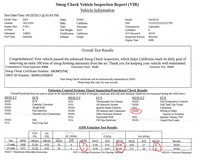Recapping My Decade of Using and Experimenting With Alternative Fuels +VIDEO
 |
By Marc J. Rauch
Exec. Vice President/Co-Publisher
THE AUTO CHANNEL
 Marc J. Rauch |
I first learned about the potential of alternative engine fuels in the late 1970's while doing some unrelated marketing research in the giant New York Public Library on Fifth Avenue. I came across a book that described turning corn and other farm crops into ethanol and methanol.
For a guy who grew up primarily in Brooklyn and Queens, farming was as alien to me as the dark side of the moon. Nevertheless, the story was riveting because it presented economic possibilities that made my head spin: replacing foreign petroleum oil fuels with domestically produced fuels from crops...WOW!
With the 1970's oil crisis still very much on my mind (and on the minds of most Americans), it was a thrilling discovery. But as I was busy trying to build an advertising agency the last thing I could focus on was where to build silos in NYC to house all the harvested crops needed to produce biofuels.
Alas, it would take two decades before I could re-examine the potential for alternative fuels again. Along the way, I co-founded The Auto Channel and TheAutoChannel.com with Bob Gordon, and added greatly to my personal automotive experience from owning a fairly wide variety of new and classic vehicles.
After the September 11, 2001 attacks and the dramatic rise in the price of petroleum oil fuels, The Auto Channel began examining alternative fuels in greater detail - not just Bob and I, our long time business associate Mark Fulmer and some of our correspondents also caught the alt fuel bug.
As I have often written in previous articles, although we were all well aware of smog and airborne health problems, our interest in alternative fuels centered on energy independence and the wondrous economic potential of alternative fuels. We read more, we attended and covered as many alternative energy events as we could, and we discussed the subject with a lot of people...lots of people.
We were feverishly fascinated; almost like a sexual attraction. We delved into all forms of alternative energy and fuels, including solar, wind, and even compressed air...that's right compressed air to power a passenger vehicle (See: Zero-Emissions are Up in The Air at MDI.
Our position on "energy independence" was and is based on two points:
1. Freeing the country of dependence and extortion from foreign sources for engine fuels - this is sort of the normal stated goal of energy independence.
2. Freeing individuals from the philosophical and societal anguish that their automobile desires or requirements were existentially irresponsible, if not downright globally catastrophic - This concern grew out of the 1970's alarm that big cars were rapidly draining the world's petroleum supply while choking us all with poisonous fumes.
Of course, most of us now know that the global supply issue was a canard, while the health issue was and is the serious problem that must be overcome.
We believe that people should own and drive what they want. If they want a large vehicle that burns lots of fuel, and they can afford it, then they should have the freedom to do so. The only legitimate concern is if the vehicle spews too much harmful emissions into the air. If a fuel could be easily substituted for gasoline or diesel that reduces harmful emissions, regardless of the size of the vehicle and its engine, then vehicle size is irrelevant.
By the mid-2000's we were reporting and opining on alternative fuel and energy issues almost as often as we did on conventional automotive issues. However, we sort of hit an intellectual roadblock. Although we had gained great book knowledge, we had little personal practical knowledge and experience to back up the book learning.
We looked for additional opportunities to test drive realistic alternative fuel vehicles: Vehicles powered by compressed natural gas, hydrogen, propane, electric, and ethanol. Obviously, our ownership of The Auto Channel opened the door for us to do quite a lot of this.
In addition, even when not test driving press fleet flex-fuel (ethanol) vehicles, I experimented with using higher blends of ethanol-gasoline in hundreds of non-flex fuel vehicles I drove. When traveling and driving rental cars, I did this a lot. What I discovered was that every non-flex fuel gasoline-powered vehicle I drove could use high levels of ethanol-gasoline blends with little or no change in vehicle performance. And, of course, no damage was ever done to the vehicles. I splash-blended E20, E25, E30, E35, E40, and so on by first pumping in E85 and then topping off with E10.
Naturally, we couldn't do the same level of experimentation with CNG and hydrogen since it wasn't possible to test dedicated CNG, propane, and hydrogen press fleet vehicles with the same regularity (and no car rental company offered these types of cars for rent).
While this experimentation increased our knowledge and gave us some practical experience, we were still pretty much on the outside looking in. We could answer lots of questions, provide somewhat intelligent arguments to the haters of alt fuels and vehicles, but we were at another roadblock: our knowledge and experience at that time could only take us so far.
Ten years ago, when the petroleum oil industry still treated natural gas and propane as ugly step-children, they circulated many of the same lies about CNG and propane as they did about ethanol. They claimed that CNG/propane damaged engines, provided less power and mileage, caused greater pollution, and so on. We were constantly fending off emails from the haters. And many of the negative claims were completely nonsensical. One of my favorite stupid claims was that it took thirty minutes or more to fill the CNG tanks of a passenger car.
In 2008, I wrote my first long paper on alternative fuels. It was a two-parter, titled respectively, "NO NEW GASOLINE-POWERED VEHICLES IN THE U.S. BY 2014...Can It Be Done?" and "NO NEW GASOLINE-POWERED VEHICLES IN THE U.S. BY 2014...How It Can Be Done!"
This story was published prior to the 2008 elections, and about two months prior to Barack Obama's erstwhile energy speech when he was competing for the Democrat nomination to run for president. As we all know, none of the items presented by Mr. Obama in his energy speech ever came to pass during his two terms as president, but that's something to discuss at another time.
By this time two alternative fuels rose to the top of our list: CNG and ethanol.
 |
I started shopping for a CNG-powered vehicle. I wanted to put the pedal to the metal, and really get a taste of the pudding, so to speak, for what CNG is all about. Unfortunately, by 2008 the only automobile company still making CNG cars for America was Honda (a CNG version of their Civic compact car), and Honda's extremely limited production capacity of the CNG Civic meant that I couldn't buy a new CNG car, so I had to resort to looking for a used vehicle.
I finally located a used factory converted CNG Dodge Ram Van at a dealership in the Los Angeles area. I flew into L.A., rented a car and drove to the dealership. As it turned out, I was in need of a van for business reasons (to use as a video production vehicle), so I felt that getting a full size van would come in very handy, in addition to allowing me to experiment.
After buying the van, the long drive home was very uneventful. Outside of having to chart where I could buy CNG, everything was very routine. The vehicle performed perfectly (as perfect as any full size van could be expected).
I had no sensation of loss of power, and had no trouble accelerating to the legal speed limit (plus the extra 5-15 mph that everyone drives at). Climbing the "grape vine" north of L.A. proved no problem, and each time I stopped to fill up it took no longer than it would take to fill a gasoline tank. The only aspect that was different was that most CNG filling stations are just basic filling facilities. If I wanted a coffee or to go to the bathroom, I had to stop at a conventional convenience store.
This experience with CNG - this mundane experience - was the same experience I had for the next eight years every time I drove the van. My engine wasn't destroyed by CNG use, my vehicle always passed smog tests with flying colors (and with lower harmful emissions), I saved money on fuel, and because the van was approved for HOV lane use, I could drive in carpool lanes even when I was alone. In many cases I didn't have to pay bridge or tunnel tolls.
I definitely proved that CNG is a great fuel and that CNG-powered vehicles are as good or better than any comparable gasoline-powered vehicle.
However, there are two problems with CNG. The first is that no automobile manufacturers are mass producing CNG vehicles for the United States. Even Honda ceased their very limited production of CNG Civics. The second problem is that Federal and most state regulations make it almost economically impossible to convert an existing gasoline passenger vehicle to run on CNG; and in some states it is not legal to do the conversion regardless of how much you spend. Therefore, CNG as an engine fuel, while abundant and domestically produced, has been rendered irrelevant.
ETHANOL - The Single Solution Fuel
Shortly after buying the van, I started looking for a used non-flex fuel gasoline powered car to buy so that I could conduct extended long-term ethanol tests.
One of the best aspects of using ethanol is that nearly all gasoline-powered vehicles on the road, and all brand new gasoline vehicles, can run on ethanol or ethanol-gasoline blends without any engine modifications needed.
 |
I had the opportunity to buy a friend's used 2002 non-flex fuel Ford Taurus. He was asking $3,500. I immediately bought it. I figured that one way or another, the purchase price would be worth its weight in editorial gold by providing The Auto Channel with some great stories and practical ethanol experience.
Incidentally, I also purchased a small still to see if it is really possible for average people to produce their own ethanol, if need be. As I learned, it is possible, and rather simple, but I'll also save this story for another time.
Over the past few years, my Ford Taurus has been the subject of several articles I've written about ethanol, and an important part of the speeches I've given at industry and government events.
On multiple occasions I've related how I fueled up on every ethanol-gasoline blend from E10 to E85, with the only problem being that the "check engine" light might illuminate. I could save up to $1.00 per gallon of fuel by mixing E85 with standard E10 fuel. I never experienced any engine or performance problems related to the use of ethanol.
 Ford Taurus smog test |
In fact, the single most noteworthy experience I had with my 2002 non-flex fuel Ford Taurus was the first time I took the vehicle for a smog test after using high ethanol-gasoline blends for about two years. The measured PPM results were an astounding "0" for CO (carbon monoxide), "0" for NO (nitrogen oxide), and "1" for HC (hydrocarbon). In other words, the high use of ethanol fuel made my car super clean. If the general public followed my example all future emissions' goals would be met today, not in 2030 or 2040...right now. And consumers would save money, too.
All that has to happen is for the president of the U.S. to publicly acknowledge that high ethanol-gasoline blends are safe for all modern gasoline-powered passenger vehicles (mid-1990's and newer), and to direct the EPA to remove all cautionary notices to the contrary. A move like this would allow America to stop importing all foreign petroleum oil for fuel, make us energy independent, and be a great financial boon to the U.S. economy.
In conducting my own personal tests I did what few if any other automotive reporters have done: put my money where my mouth is. More importantly, in all the online skirmishes I've engaged in with alternative fuel haters - or as I've often referred to them, gasoline whores - I've never come across one person who spoke from personal experience...they only quote the lies told to them by the oil industry. On many occasions I've asked them if they've ever tried using a high ethanol-gasoline blend in their personal vehicles or rental cars, but they never respond. It would be the simplest thing to do to prove their claims that ethanol is bad by just renting a car for a few days and using ethanol. But they don't do it.
I've issued challenges to publicly debate these gasoline whores, or at least prove my findings wrong, but there have been no comers. I've written about these challenges and tried to shame them into responses. In some instances there are brief responses where they ask me some additional information, but after I provide the information they disappear, and in almost all instances never address the subject again in the media. (See ANOTHER ONE BITES THE DUST for a list of some of my most enjoyable literary skirmishes)
In the egregious case of Robert Bryce, author of "GUSHER OF LIES," he continues to tout the same erroneous information that he spouted in 2008 when he wrote his trashy book, even though everything negative he claimed has either been disproved or made redundant by evolving technologies.
In the case of Robert L. Bradley, co-author of "ENERGY - THE MASTER RESOURCE," I met for the first time an alt fuel hater who was truly looking for, and willing to accept, other information. Rob Bradley and I corresponded several times. In the end he acknowledged that he hadn't considered the information I presented when he wrote his treatise "OIL, GAS, AND GOVERNMENT: THE U.S. EXPERIENCE (1996)," and said he would include the information in his treatise going forward. He also asked me to write a short "thesis" for his website to explain why and how gasoline wrongfully became our primary engine fuel. He published my "thesis" nine months ago, and since that time not one of his readers or followers has attempted to challenge or contradict the conclusions I presented.
MOVING ON
The nation is at an interesting point in time; and I'm at an new crossroad in my experimentation with ethanol, as I'll explain below.
Most new gasoline-powered passenger vehicles are openly approved for E15, which means there's no threat of voiding the warranty for these new cars if the owner uses E15, assuming he or she can find it. A government mandate to use E15 or E20 or E25 would be an appropriate, and safe, action for the new Trump Administration to take.
Next generation internal combustion engines will require higher ethanol-gasoline blends to meet harmful emission mitigation goals, while allowing the vehicles to meet performance specifications. This will mean E20 to E50 or higher. The oil industry will have no option but to acquiesce, and probably wind up investing in ethanol plants to stay in control. It'll be fun to see how they change their tune and start singing the praises of ethanol, just as Standard Oil used to do in the United Kingdom in the 1920's (a fact that's little known to American consumers).
As for me, I'm moving on, too. I've now traded in my non-flex fuel Ford Taurus for a late model flex-fuel Dodge Grand Caravan, and I'm a couple days away from retiring my CNG Dodge Ram van. Needless to say, I'll continue to write and speak about the benefits of ethanol, and my testing of ethanol blends will now focus on which level of ethanol-gasoline blends gives my new van the best and most economical performance (many people say that E40 or E50 will be best...we'll see, and I'll let you know).
And for fun, my wife's non-flex fuel Nissan Altima will now serve as our test vehicle for various ethanol-gasoline blends in a non-flex fuel car.
For lots more information that reveals the truth about ethanol and other alternative fuels please read and watch some of the following:
TRUTH ABOUT ETHANOL - 60+ page Reply to Robert Bryce's GUSHER OF LIES
Life As We Might Have Known It: What If Ethanol Was Our Primary Engine Fuel
The Rise and Fall of General Motors and the Subjugation of the Industrialized World
The Irrelevance Of BTU Rating - Big Oil's Gimmick To Hoodwink The Public
Every Spark-Ignited Internal Combustion Engine Ever Produced Has Been Damaged By Gasoline
Detroit News Story Goes Overboard in Slamming Ethanol
Why Do Small Engines Suffer From Ethanol Problems?
Ethanol Does NOT Suck Water Out Of The Air
Rolling Oil and Gasoline Bombs - Another Great Reason To Switch To Ethanol
NO NEW GASOLINE-POWERED VEHICLES IN THE U.S. BY 2014...Can It Be Done?
The Gasoline Companies Should Fund the Big Three Bailout
GM Australia Discovers Ethanol as GM America Ignores It
Are Ethanol Opponents Sniffing Glue?
The Auto Channel Fights For The Truth About Ethanol
John Stossel Relies on "Myths, Lies and Downright Stupidity" to Knock Alternative Fuels
An Open Letter To Tim Searchinger and All The Other Gasoline Whores
Biofuels Are Worth Every Effort and Cost
Why Is Getting US Off Gasoline So Important to The Auto Channel?
Why Is Jay Leno Misrepresenting Ethanol
Ethanol Honesty Is The Best Energy Policy
The Figurative Ethanol Blend Wall is a Fictional Ethanol Blend Wall
Open Letter To Ken Cohen ExxonMobil
Lauren Fix Takes Ethanol Opposition To New Level of Stupidity
Open Letter To Green Car Reports About Ethanol
Open Letter To Mark Levin About Ethanol
Open Letter To Jillian Kay Melchor and National Review
Open Letter To Barry Ritholtz and Bloomberg About Ethanol
Meet The New 'Tool' In Big Oil's Efforts To Scuttle Ethanol
Every Spark-Ignited Internal Combustion Engine Ever Produced Has Been Damaged By Gasoline
Biofuel Blunder? Renewable Fuel Mandate Is Having A Negative Effect on Home Run Totals
AAA Blunder on Ethanol Sets Off Firestorm of Criticism
Why Does AAA and Big Oil Feel They Must Lie to America?
AAA Gets It Wrong On Ethanol Again
Oil Industry Stages Another Sham Anti-Ethanol Press Conference
Ethanol Chronicles - An Almost Daily Blog
The Case Against Ethanol Opponents: They Are Simply Incorrect
It's Time To Rethink The Value Of PhD


